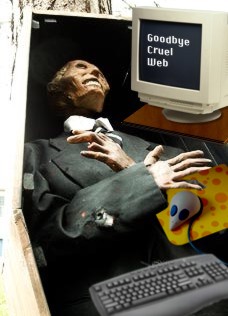Wikideath
|
|
Perhaps the most complex and paradoxical of all Wiki-related psychological issues, wikideath involves the symbolic elimination of the core online persona belonging by a user of a publicly-editable Wiki (or other anonymous online-community) website. However, unlike physical death, which commonly involves symptoms such as complete respiratory cessation, circulatory collapse, putrefaction, decomposition, and eventual consumption by worms and small insects, wikideath can actually be therapeutic, even life-saving. Wikideath also differs from physical death in that it is not always permanent, and indeed may last only a few weeks before either wikiresurrection or wikizombification occurs.
Big Production Number[edit | edit source]
According to Dr. Sigmundheimer F. Rhoid, noted expert in online-persona fatalities and the author of Dead, Buried, and Hopefully Never Coming Back, wikideath goes beyond mere stoppage of wiki-based activity, or various common forms of Wiki Mule account transfer. "Only the very, very smart ones know to simply disappear," he writes. "At least 95 percent of established Wiki users, especially wikithugs and wikipedophiles, have to make a huuuuge production out of it. Obviously, the more monomanical or emotionally-scarred the user is, the bigger the show."
Typically, a "last hurrah" performance by a wiki user with at least several hundred edits over a period of 3-6 months or more will involve any or all of the following:
The Dump-Off[edit | edit source]
This usually is an entry on a sympathetic user's "talk page" explaining, in lavish detail, all of the user's "concerns" and "warnings" about the wiki's future, as placed firmly into the hands of the user's detractors and critics, and pleading with the user whose talk page it is to "try to be a force for good" by carrying on the "fight" after the user leaves. This is usually a clear indication of online hypervigilance, which can be brought about by both online and real-world stress factors.
The Parting Finger[edit | edit source]
Also normally placed on a talk page, but one belonging to an enemy user, these comments obviously tend to be highly caustic and sarcastic, and are often accompanied by a symbolic image of someone making a defiant middle-finger gesture directly at the camera. Users more prone to vulgarity and immaturity may instead use a photograph of a person defiantly displaying their bare anus.
The Kiss-Off Story[edit | edit source]
More often posted as an actual article, often at a late hour to increase the chances of it not being noticed (and therefore deleted), this material tends to be highly allegorical - if not utterly incomprehensible to anyone not directly involved with whatever problem or conflict drove the user away in the first place. While normally somewhat respectful in tone, the user will nearly always attempt to embed subtle (and not-so-subtle) "zingers" in a ludicrously futile attempt to produce a guilt response from other users.
The Emotional Outpouring[edit | edit source]
This last type of performance is rare, due to the cut-throat nature of wiki society. Similar to a classic suicide note, this type of final post to the wiki by a highly emotional user might contain a bewildering variety of elements ranging from near self-flagellation to invective-filled hatred and bitterness. However, since these postings are almost always hysterically (and unintentionally) laughable, they are also the most likely to be responded to with a blizzard of public scorn and ridicule, which most users undergoing wikideath prefer to avoid if at all possible.
Degrees of Self-Infliction[edit | edit source]
The extent to which a wikideath will be carried out in public is also based largely on the extent of the "flameout effect" that produced the user's desire to undergo wikideath in the first place. Since most such users crave attention above all else, the attention gained during whatever conflict or dispute produced the flameout takes on a narcotic-like aspect, driving the user to ever-increasing theatrics as his or her internal illness-process gains behavioral ascendancy.
"The sad thing is, those are the people who can never truly let go," says Dr. Rhoid, who has guided several attempts to cure "wikijunkies" through formally-guided wikideath procedures - not all of them successful. "The whole problem with computers is that they're everywhere, and they're perfectly legal, yet in the hands of one of these patients they might as well be 97-percent pure China White heroin coming out of a dirty needle. But it's very hard to take this particular drug away from someone who really wants a fix. You can even get a person to hand over his laptop to you, right there in the consulting room, but when he leaves he'll just go straight to the library, or stay late at work. You have to destroy the motivation behind the addiction first, and that usually requires a lot of expensive psychotherapy," he concludes, fingering the lapels of his $4,000 Armani suit.
The Withdrawal Phase[edit | edit source]
The most difficult phase of wikideath occurs after the "big break," which is usually the time of the final posting, or in those extremely rare cases where the user manages to restrain himself from an embarrassing Production Number, the user's prearranged cutoff date. "Final postings give you some short-term closure, though it's fleeting to say the least," suggests Dr. Rhoid. "It's much harder to simply stop, but it's ultimately far more rewarding, especially if you've actually been helpful to others on occasion, and someone comes along and points out something good or interesting you did. In fact, there have even been cases where this opened the door to wikiresurrection, long before it would normally be possible."
The most important aspect of a successful withdrawal is checking-avoidance. "It's actually okay to write things that you'll never post; that's often therapeutic," continues Dr. Rhoid. "But if you've got that broadband connection going and you're still obsessively pulling up the Recent Changes every 10 minutes like it's some sort of TiVo 'What's On' guide, you really haven't helped yourself one bit. All you're doing at that point is lurking, and pathetically at that."
Wikiresurrection[edit | edit source]
Essentially, the longer the user stays "dead," the better the chances of eventual rehabilitation and resurrection. Experts suggest that while a cold-turkey period of at least 14 days is required to "kick the habit" of wiki addiction, a period of at least 4 to 6 months is required before a user can successfully return who has left the wiki on bad terms with the site's administrators, or with a significant number of other active users.
"The potential for resurrection really has more to do with content-creation talent than anything else, though," suggests Dr. Rhoid. "Wait a minute, what am I saying? Sorry, strike that last bit. Just quote me as saying you might as well just stay out, since it's probably better for you anyway."
Wikizombification[edit | edit source]
Users pursuing failed or futile attempts at resurrection under their preferred/primary account name are said to become wikizombies - one of the least desirable entities in cyberspace. Shunned by the rest of the community, and insulted, berated, and banned by Wikipedophile administrators at every turn, a wikizombie account will often begin to show signs of what might - in meatspace, at least - be termed an "ideas-of-reference disorder." The user will internalize and personalize nearly every event, or even content-posting, that appears to be related to the conflict (and/or hypervigilance construct) that led to the user's wikideath earlier on.
"The sad thing about these situations," concludes Dr. Rhoid, "is that on wiki sites, quite often people actually will direct subtle or indirect personal jabs or insults at wikidead or wikizombie users, either because they themselves want people to know how angry they are, or else they do it purely for the amusement value. But that just validates these users' illness processes and tempts them to re-enter the fray prematurely, which ultimately makes things even worse. Most of the people doing this haven't spent much time in the real world interacting with real people anyway, so it never even occurs to them that real people might take these things personally and get really pissed off. In the end, it just leads to an endless cycle of conflict, bans, and pointless yammering about a lot of really stupid crap."
See also[edit | edit source]
| Your handy guide to the psychological issues of wiki users like you! |
| UNPSYCHLOPEDIA |
|---|
 |
| You're gonna get banned |
| No, seriously |
| Get some help |


